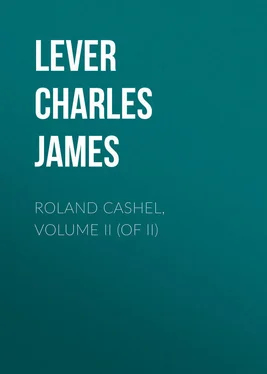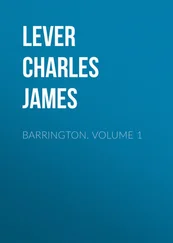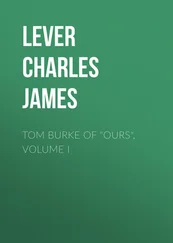Charles Lever - Roland Cashel, Volume II (of II)
Здесь есть возможность читать онлайн «Charles Lever - Roland Cashel, Volume II (of II)» — ознакомительный отрывок электронной книги совершенно бесплатно, а после прочтения отрывка купить полную версию. В некоторых случаях можно слушать аудио, скачать через торрент в формате fb2 и присутствует краткое содержание. Жанр: literature_19, foreign_antique, foreign_prose, на английском языке. Описание произведения, (предисловие) а так же отзывы посетителей доступны на портале библиотеки ЛибКат.
- Название:Roland Cashel, Volume II (of II)
- Автор:
- Жанр:
- Год:неизвестен
- ISBN:нет данных
- Рейтинг книги:5 / 5. Голосов: 1
-
Избранное:Добавить в избранное
- Отзывы:
-
Ваша оценка:
- 100
- 1
- 2
- 3
- 4
- 5
Roland Cashel, Volume II (of II): краткое содержание, описание и аннотация
Предлагаем к чтению аннотацию, описание, краткое содержание или предисловие (зависит от того, что написал сам автор книги «Roland Cashel, Volume II (of II)»). Если вы не нашли необходимую информацию о книге — напишите в комментариях, мы постараемся отыскать её.
Roland Cashel, Volume II (of II) — читать онлайн ознакомительный отрывок
Ниже представлен текст книги, разбитый по страницам. Система сохранения места последней прочитанной страницы, позволяет с удобством читать онлайн бесплатно книгу «Roland Cashel, Volume II (of II)», без необходимости каждый раз заново искать на чём Вы остановились. Поставьте закладку, и сможете в любой момент перейти на страницу, на которой закончили чтение.
Интервал:
Закладка:
“You talk of forgery and penalties as if we were about to commit a felony,” said Linton, laughing. “Pray give me the cream. There is really no such peril in the case, and if there were, it would be all mine.”
“I know nothing of your laws here – I desire to know nothing of them,” said the Italian, haughtily; “but if it should be my lot to be arraigned, let it be for something more worthy of manhood. I ‘ll sign the paper, but I shall leave the country at once.”
No words could have been more grateful to Linton’s ears than these; he was, even at that very moment, considering in his own mind in what way to disembarrass himself of his “friend” when this service should have been effected.
“As you please, Giovanni,” said be, gravely. “I regret to part company so soon with one whose frankness so well accords with my own humor.”
The Italian’s lips parted slightly, and a smile of cold and dubious meaning flitted across his dark features.
“We part here, then,” said he, rising from the table. “There is a vessel leaves this for Bristol at noon to-day; it is already past eleven o’clock.”
“I’ll not delay,” said Linton, rising and ringing the bell; “send Mr. Swindon here,” said he to the waiter, while he opened a parchment document upon the table, and after hastily glancing over it, folded it carefully again, leaving uppermost the margin, where certain pencil-marks indicated the places of signature. “This is yours, Giovanni,” said he, placing a weighty purse in the Italian’s hand, who took it with all the easy indifference of one whose feelings of shame were not too acute. “Remember what I have – ”
There was no time to finish, for already a light tap was-heard at the door, and the landlord, followed by the head waiter, entered.
“We were pressed for time, Swindon,” said Linton, as he examined the pens, which, like all hotel ones, seemed invented for ruling music paper, “and have sent for you to witness the signature to this document. Here, Cashel, you are to sign here,” said he, turning to Giovanni, who-had just lighted a cigar, and was smoking away with all imaginable coolness. The Italian took the pen, and with a bold and steady hand wrote the words “Roland Cashel.”
“Mr. Swindon at this side; Mr. Nipkin’s name comes underneath.”
“You acknowledge this for your hand and seal, sir?” said Swindon, turning towards Giovanni.
“I do,” said the Italian, in an accent which did not betray the slightest emotion, nor any trace of foreign pronunciation.
“All right; thank you, Swindon – thanks, Mr. Nipkin,” said Linton, as, with an elation of countenance all his efforts could not suppress, he folded up the parchment; “and now, will you order my horses at once?”
The landlord and the waiter left the room, and Linton found himself once more alone with Giovanni; the only consolation he felt being that it was for the last time. There was a pause, in which each gazed steadily at the other without a word. At last, with a long-drawn sigh, Giovanni exclaimed, —
“Perdio! but it is hard to do.” And with this he pressed his hat upon his brows, and waving a careless farewell with his hand, walked out, leaving Linton in a state of amazement not altogether unmingled with fear. Tom watched the tall and stalwart figure of the foreigner as he moved through the crowd that filled the quay, and it was with a sense of relief he could not explain to himself that he saw him cross the plank that led to the steamer, on whose deck numerous passengers were already assembled.
The bell rang out in warning of her approaching departure, and Linton kept his eyes intently fixed upon the one figure, which towered above the others around him. Already the scene of bustle portended the moment of starting, and some were hastening on board, as others, with not less eagerness, were endeavoring to get on shore; when, just at that instant, the landlord’s voice was heard.
“Mr. Hammond is just going off, sir; he wants to say one word to you before he goes.”
Mr. Hammond had just taken his seat in his carriage, and sat with one hand upon the door, awaiting Linton’s coming.
“I am run sharp for time, Mr. Linton,” cried he, “and have not a second to lose. I wish sincerely I could have given a little more time to that document – not indeed that any feature of difficulty exists in forming an opinion, only that I believe I could have put your friend on the safe road as to his future course.”
“You regard it then as authentic – as a good and valid instrument?” said Linton, in a low but eager voice.
“So much so,” said Hammond, lowering his tone to a mere whisper, “that if he does not marry the young lady in question, I would not give him twenty shillings for his title.”
“By Jove!” exclaimed Linton, leaning his head on the door of the carriage, as if to conceal his chagrin, but in reality to hide the exuberance of his joy; “and this is your candid opinion of the case?”
“I am willing to stake my fame as a lawyer on the issue; for, remember, the whole history of the suit is familiar to me. I recollect well the flaws in the course of proofs adduced, and I see how this discovery reconciles each discrepancy, and supplies every missing link of the chain.”
“Poor fellow! – it will be a sad blow for him,” said Linton, with admirably feigned emotion.
“But it need not, Mr. Linton; the church can tie a knot not even an equity suit can open. Let him marry.”
“Ay, if he will.”
“Tell him he must; tell him what I now tell you, that this girl is the greatest heiress in the land, and that he is a beggar. Plain speaking, Mr. Linton, but time is short Good-bye.”
“One word more. Is the document of such a nature that leaves him no case whatever? Is all the ground cut away beneath his feet?”
“Every inch of it. Once more, good-bye. Here is your parchment; keep it safely. There are few men in this city hold in their hands a paper of such moment.”
“I’ll take good care of it,” said Linton, sententiously; “and so good-bye, and a safe journey to you. I ‘ll not forget our conversation of this morning; Meek shall hear of it before I sleep to-night. Adieu.”
“The richest heiress in the land, and Cashel a beggar,” repeated Linton, slowly, to himself, as the carriage drove off. “Charley Frobisher would say, ‘Hedge on the double event,’ but I ‘ll keep my book.” And, with this slang reflection, he sauntered into the inn to wait for his horses.
CHAPTER VIII. ROLAND DISCOVERS THAT HE HAS OVERDRAWN
– His counsel, like his physic,
If hard to take, was good when taken.
Long before the guests of Tubbermore were astir, Cashel sat in his library awaiting the arrival of Dr. Tiernay. In obedience to Roland’s request, Mr. Kennyfeck was present, and affected to look over books or out of windows, – to scan over prints or inspect maps, – anything, in short, which should pass the time and shorten the interval of waiting, doubly awkward from being the first moment he had been alone with Cashel since his arrival. Cashel was silent and absorbed, and, more intent upon following out the train of his own thoughts, never noticed the various arts by which Kennyfeck affected to interest himself. The solicitor, too, bent from time to time a stealthy look on the young man, on whose features he had rarely seen the same traces of deep reflection.
At last, with a half start, as if suddenly awaking, Cashel sat up in his chair, and said, —
“Have I explained to you what Dr. Tiernay’s business is here this morning? It is to make a proposition from Mr. Corrigan for the sale of his interest in Tubber-beg. He wishes to leave the country and go abroad.”
Читать дальшеИнтервал:
Закладка:
Похожие книги на «Roland Cashel, Volume II (of II)»
Представляем Вашему вниманию похожие книги на «Roland Cashel, Volume II (of II)» списком для выбора. Мы отобрали схожую по названию и смыслу литературу в надежде предоставить читателям больше вариантов отыскать новые, интересные, ещё непрочитанные произведения.
Обсуждение, отзывы о книге «Roland Cashel, Volume II (of II)» и просто собственные мнения читателей. Оставьте ваши комментарии, напишите, что Вы думаете о произведении, его смысле или главных героях. Укажите что конкретно понравилось, а что нет, и почему Вы так считаете.












